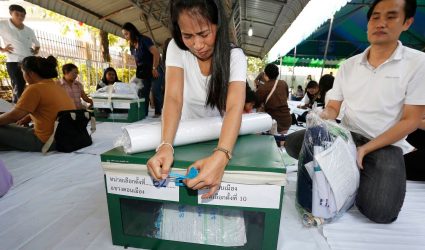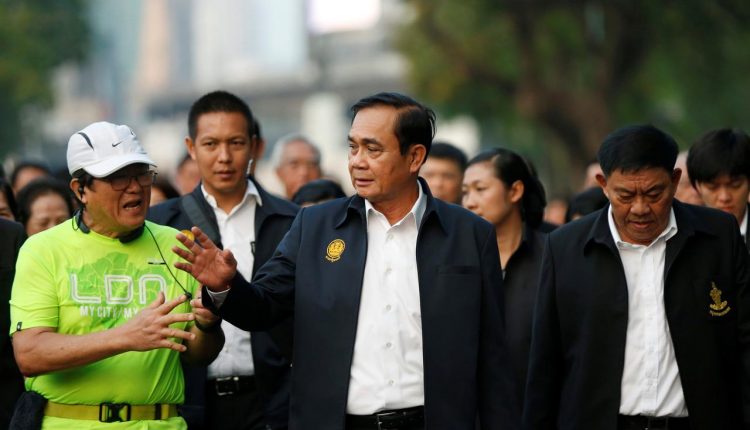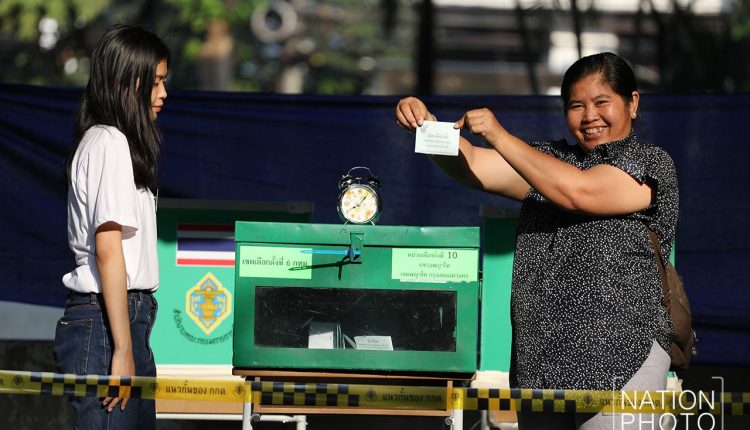Thai election: junta in driver’s seat as Thaksin-backed rival cries foul

Election commission says pro-military Palang Pracharat party leads popular vote, but delays announcement of full results until Monday. Leaders of Pheu Thai Party linked to Thaksin Shinawatra say voting ‘irregularities’ need to be investigated.
(SCMP) – Thailand’s election commission late on Sunday said the pro-military party of junta chief Prayuth Chan-ocha was headed towards a shock popular vote victory over its arch-rival, the populist Shinawatra political bloc, but did not release full results of the parliamentary seat count in the kingdom’s long-delayed polls.
Local media complained of “unstable vote counts” from the commission, with the Khaosod English news portal reporting that in one instance, the difference in total votes between parties fluctuated by a million within minutes.
Prayuth’s Palang Pracharat Party and the Pheu Thai Party linked to exiled former prime minister Thaksin Shinawatra both held press conferences late in the evening.

Pheu Thai’s secretary general Phumtham Vechayachai said “irregularities” in the polls needed to be sorted out. In the Palang Pracharat camp, the mood was far more jubilant.
Its leader Uttama Savanayana did not declare victory but suggested the election outcome appeared to be “made in heaven” for his party. He said the party – founded just last year – was ready to form the next government if official results show it is the victor.
The election commission had earlier said with 92 per cent of votes counted, Palang Pracharat had gained some 7.5 million votes over Pheu Thai’s 7 million.
Voter turnout was 65.6 per cent, or 33.7 million of the 51.4 million eligible voters – well below the 80 per cent the commission had predicted before Sunday’s polls.

Election commission chairman Itthiporn Boonprakong abruptly ended a press conference just before 10pm after announcing that fuller results would be released on Monday.
He is expected to chair a press conference at 2pm local time.
Aside from Palang Pracharat’s apparent shock lead over Pheu Thai, another curveball that the election threw up was the stellar showing by the regional Bhumjaithai Party.
The party – which campaigned on a policy platform that included the full legalisation of marijuana – bested the Democrat Party of former prime minister Abhisit Vejjajiva.
The Democrats’ slump to fourth place stood in stark contrast to its longtime position as the second biggest political bloc in the country after the ruralist Shinawatra faction.
The Oxford-educated Vejjajiva said late on Sunday he was quitting as party leader, making him the first major casualty of the election – the country’s first since Prayuth seized power from a Pheu Thai government led by Thaksin’s sister Yingluck in May 2014.
ARVE Error: src mismatch
provider: youtube
url: https://www.youtube.com/watch?v=wiF1wVVm_4o
src in org: https://www.youtube.com/embed/wiF1wVVm_4o?wmode=transparent&rel=0&feature=oembed
src in mod: https://www.youtube.com/embed/wiF1wVVm_4o?wmode=transparent&rel=0
src gen org: https://www.youtube.com/embed/wiF1wVVm_4o
Exit polls earlier projected the Palang Pracharat Party, whose main aim was to help Prayuth stay on as prime minister, would win only 96 seats.
The late-night data released by the election commission suggests its seat count will be much higher. The country’s convoluted parliamentary system comprising constituency and party list seats – criticised by observers as favouring the pro-junta party – could result in a scenario where there is a mismatch between popular vote and legislative representation.
The junta-crafted 2017 constitution also grants the 250-seat military-appointed Senate an equal vote as lawmakers in choosing who becomes prime minister. In the event Pheu Thai is the biggest party, there is almost no chance its leader Sudarat Keyuraphan will be named prime minister.
In theory, Prayuth can become prime minister if his party picks up just 25 per cent of parliamentary seats, or about 126 of the 500 seats up for grabs. Along with the 250 senate votes, he would have a simple majority of both houses to be named prime minister.
ARVE Error: src mismatch
provider: youtube
url: https://www.youtube.com/watch?v=9GRrMHzHOpk
src in org: https://www.youtube.com/embed/9GRrMHzHOpk?wmode=transparent&rel=0&feature=oembed
src in mod: https://www.youtube.com/embed/9GRrMHzHOpk?wmode=transparent&rel=0
src gen org: https://www.youtube.com/embed/9GRrMHzHOpk
One Thai political analyst said he saw a Palang Pracharat government as the only plausible outcome of the election.
“Regardless of the outcome, Palang Pracharat will form the government. Pheu Thai has only one option, which is to secure 376 [seats in the upper and lower houses of parliament], and that is impossible,” said Titipol Phakdeewanich, a political scientist with the Ubon Ratchathani University.
“The voices of the people are being ignored by the Thai establishment. The military and Palang Pracharat do not accept democratic principles,” he said.
Sunday’s general election, which proceeded smoothly, had been delayed multiple times by Prayuth’s junta. A date was finally set early this year.
The vote is Thailand’s sixth election in two politically charged decades in which only one government served out an entire term. Two coups – including one against Thaksin in 2006 – were staged by the Royal Thai Army.
The putsches continued the military’s decades-old penchant for intervening in politics – it has staged 12 successful coups since 1932 – each time there is a deadlock among civilian politicians.
Pheu Thai won the 2011 election by a landslide and was the victor of the 2014 polls boycotted by the Democrats.
Previous incarnations of the party won the 2001, 2006 and 2007 polls.
Thaksin, the force behind these parties’ rural-backed mass movement, is widely credited for revolutionising the country’s politics by campaigning on policies – mainly offering economic sweeteners to the poor – instead of solely depending on feudal networks.
Such networks were integral to the survival of establishment and pro-military parties that had previously dominated politics, and Thaksin is loathed by the former because of the disruption he caused to their stranglehold on power.
Late on Sunday, the local commentariat was digesting the poll’s most dramatic development – the capitulation of Abhisit’s Democrats. Long backed by Bangkok’s 10 million people, the party this time won no seats in the country’s capital.
Some observers said the party’s thrashing was a long time coming because it had tried to stay ambivalent on the rivalry between pro-democrats and the military instead of taking a side. Bangkok’s parliamentary seats ended up being split between the Future Forward Party led by charismatic autoparts billionaire Thanathorn Juangroongruangkit, and Palang Pracharat.
Bhumjaithai also seized several urban seats.
Sunday’s results are unofficial, with the final tally expected to be released only after the coronation of King Maha Vajiralongkorn – who is presiding over his first general election – from May 4-6.
The monarch late on Saturday issued a rare statement urging voters to pick “good people” over “bad people” who could wreak havoc to the country’s stability.
Some Thai Twitter users reacted to the royal statement with a hashtag in Thai that translates to #oldenoughtovoteourselves.

